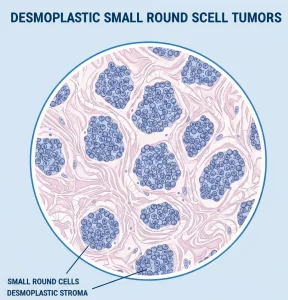Overview
Diagnosis
Tests and procedures used to diagnose desmoplastic small round cell tumors include:
Removing a sample of tissue for testing
Your healthcare professional may recommend a biopsy to remove a sample of cells for testing. The sample can be collected during surgery or through a needle passed through the skin.
Tissue samples are sent to a lab for testing
Lab tests confirm whether cancer is present. Further analysis helps identify specific DNA changes in cancer cells. These results help rule out other cancers, ensure an accurate diagnosis, and guide treatment planning.
Imaging tests
Imaging tests help determine the size, spread, and location of the tumor. These may include ultrasound, CT scans, MRI, and positron emission tomography (PET) scans.
Treatment
Treatment for desmoplastic small round cell tumors depends on the tumor’s location, size, and spread. Most people receive a combination of treatments for the best outcome.
Surgery
The goal of surgery is to remove as much cancer as possible. If the tumor has spread to nearby organs, complete removal may not be possible. In such cases, chemotherapy may be used first to shrink the tumor.
When surgery cannot remove all cancer cells, chemotherapy or radiation therapy may be given afterward to target any remaining cells.
Chemotherapy
Chemotherapy uses powerful drugs to kill cancer cells. It can be given before surgery to shrink the tumor or after surgery to destroy remaining cells. Chemotherapy may also be used if the cancer spreads to other areas to help manage symptoms such as pain.
Chemotherapy options include:
-
Chemotherapy that affects the whole body: Drugs are injected into a vein and travel throughout the body to kill rapidly growing cancer cells.
-
Chemotherapy given only to the abdomen: For tumors in the abdomen, heated chemotherapy drugs can be infused directly into the peritoneal cavity. This approach, called hyperthermic intraperitoneal chemotherapy (HIPEC), is often done after surgery.
Radiation therapy
Radiation therapy uses high-energy beams, such as X-rays or protons, to kill cancer cells. It is often used after surgery to eliminate residual cancer cells in the abdomen.
If the cancer has spread, radiation therapy can also help control symptoms and improve comfort.
Targeted drug therapy
Targeted therapy focuses on specific molecules or pathways that cancer cells use to grow. By blocking these, the treatment helps destroy cancer cells while sparing healthy tissue.
This therapy may be recommended if the cancer returns or spreads. Testing the cancer cells can help determine whether targeted drugs are likely to be effective. It can be used alone or with chemotherapy.
Coping and support
Being diagnosed with cancer can feel overwhelming. Learning ways to cope emotionally and physically can make a difference.
-
Learn about your condition and treatment options. Understanding your diagnosis helps you make confident decisions about care.
-
Keep friends and family close. Emotional and practical support from loved ones is important during treatment.
-
Find someone to talk to. Counselors, social workers, clergy members, or cancer support groups can offer comfort and guidance.
-
Ask your healthcare team about local or online cancer support groups. Organizations such as the National Cancer Institute and the American Cancer Society can also help.
Preparing for your appointment
If your healthcare provider suspects a desmoplastic small round cell tumor, you’ll likely be referred to an oncologist — a cancer specialist. Being well prepared for the appointment helps you make the most of your time.
What you can do
-
Write down all your symptoms, even those that seem unrelated.
-
Make a list of medications, supplements, and vitamins you take.
-
Bring a friend or family member to help remember information.
-
Prepare questions for your doctor and prioritize them by importance.
Questions to ask your doctor
-
Do I have cancer, and what type is it?
-
What tests are needed to confirm the diagnosis?
-
What stage is the cancer?
-
What treatment options are available, and which do you recommend?
-
Can the cancer be surgically removed?
-
What side effects should I expect from treatment?
-
Are there alternative treatment options?
-
How can I manage my other health conditions alongside this treatment?
-
Are there lifestyle changes or dietary restrictions I should follow?
-
What is my prognosis?
-
Are there brochures or reliable websites for more information?
-
Is the surgeon experienced in treating this type of tumor?
What to expect from your doctor
Your healthcare professional may ask questions such as:
-
When did you first notice symptoms?
-
Are you experiencing pain, and where?
-
Does anything improve or worsen your symptoms?
Feel free to ask any additional questions during your visit. Open communication helps ensure you understand your diagnosis and treatment plan fully.
Advertisement

